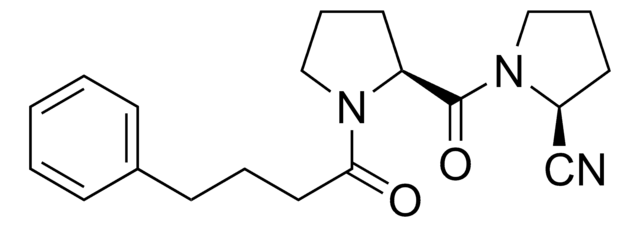SML0205
Z-Pro-prolinal
≥98% (HPLC)
Synonym(s):
Cbz-Pro-Prolinal, N-Benzyloxycarbonyl-L-prolyl-L-prolinal, Phenylmethyl (2S)-2-[(2S)-2-formylpyrrolidine-1-carbonyl]pyrrolidine-1-carboxylate, Z-Pro-Pro-CHO, Z-PP-CHO, Z-pro-pro-CHO, Z-prolyl-prolinal, ZPP
About This Item
Recommended Products
Assay
≥98% (HPLC)
form
powder
storage condition
desiccated
color
white to tan
solubility
DMSO: ≥10 mg/mL
storage temp.
−20°C
InChI
1S/C18H22N2O4/c21-12-15-8-4-10-19(15)17(22)16-9-5-11-20(16)18(23)24-13-14-6-2-1-3-7-14/h1-3,6-7,12,15-16H,4-5,8-11,13H2/t15-,16-/m0/s1
InChI key
ORZXYSPOAVJYRU-HOTGVXAUSA-N
Application
Biochem/physiol Actions
POP has been connected to memory and mood through regulation of the brain levels of its peptide substrates, which include AVP, substance P, neurotensin and TRH and is a potential target in cognitive function, memory, and neurodegenerative disorders such as amnesia, Alzheimer′s disease, and depression. POP has recently been reported to be involved in the release of the tetrapeptide acetyl-N-Ser-Asp-Lys-Pro (Ac-SDKP) from its precursor, 43-mer thymosin β4 (Tβ4). Ac-SDKP is involved in hemopoietic stem cell differentiation, is pro-angiogenic and antifibrogenic.
Signal Word
Warning
Hazard Statements
Precautionary Statements
Hazard Classifications
Acute Tox. 4 Oral - Eye Irrit. 2
Storage Class Code
11 - Combustible Solids
WGK
WGK 3
Flash Point(F)
Not applicable
Flash Point(C)
Not applicable
Certificates of Analysis (COA)
Search for Certificates of Analysis (COA) by entering the products Lot/Batch Number. Lot and Batch Numbers can be found on a product’s label following the words ‘Lot’ or ‘Batch’.
Already Own This Product?
Find documentation for the products that you have recently purchased in the Document Library.
Customers Also Viewed
Articles
We offers many products related to neuropeptidases for your research needs.
Our team of scientists has experience in all areas of research including Life Science, Material Science, Chemical Synthesis, Chromatography, Analytical and many others.
Contact Technical Service










